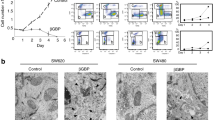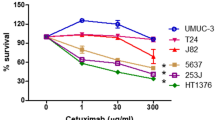Abstract
Cetuximab is a monoclonal antibody that is effective in the treatment of metastatic colorectal cancer (mCRC). Cetuximab blocks epidermal growth factor receptor (EGFR)-ligand interaction and inhibits downstream RAS–ERK activation. However, only some activating mutations in RAS affect cetuximab efficacy, and it is not clear what else mediates treatment success. Here we hypothesized that cetuximab induces immunogenic cell death (ICD) that activates a potent antitumor response. We found that cetuximab, in combination with chemotherapy, fostered ICD in CRC cells, which we measured via the endoplasmic reticulum (ER) stress response and an increase in phagocytosis by dendritic cells. ICD induction depended on the mutational status of the EGFR signaling pathway and on the inhibition of the splicing of X-box binding protein 1 (XBP1), an unfolded protein response (UPR) mediator. We confirmed the enhanced immunogenicity elicited by cetuximab in a mouse model of human EGFR-expressing CRC. Overall, we demonstrate a new, immune-related mechanism of action of cetuximab that may help to tailor personalized medicine.
This is a preview of subscription content, access via your institution
Access options
Subscribe to this journal
Receive 12 print issues and online access
$209.00 per year
only $17.42 per issue
Buy this article
- Purchase on Springer Link
- Instant access to full article PDF
Prices may be subject to local taxes which are calculated during checkout





Similar content being viewed by others
References
Fakih, M.G. et al. Metastatic colorectal cancer: current state and future directions. J. Clin. Oncol 33, 1809–1824 (2015).
Peeters, M. & Price, T. Biologic therapies in the metastatic colorectal cancer treatment continuum—applying current evidence to clinical practice. Cancer Treat. Rev. 38, 397–406 (2012).
Prenen, H. et al. PIK3CA mutations are not a major determinant of resistance to the epidermal growth factor receptor inhibitor cetuximab in metastatic colorectal cancer. Clin. Cancer Res. 15, 3184–3188 (2009).
Cunningham, D. et al. Cetuximab monotherapy and cetuximab plus irinotecan in irinotecan-refractory metastatic colorectal cancer. N. Engl. J. Med. 351, 337–345 (2004).
Van Cutsem, E. et al. Cetuximab and chemotherapy as initial treatment for metastatic colorectal cancer. N. Engl. J. Med. 360, 1408–1417 (2009).
Sorich, M.J. et al. Extended RAS mutations and anti-EGFR monoclonal antibody survival benefit in metastatic colorectal cancer: a meta-analysis of randomized, controlled trials. Ann. Oncol. 26, 13–21 (2015).
Price, T.J. et al. Panitumumab versus cetuximab in patients with chemotherapy-refractory wild-type KRAS exon 2 metastatic colorectal cancer (ASPECCT): a randomised, multicentre, open-label, non-inferiority phase 3 study. Lancet Oncol. 15, 569–579 (2014).
Arteaga, C.L. & Engelman, J.A. ERBB receptors: from oncogene discovery to basic science to mechanism-based cancer therapeutics. Cancer Cell 25, 282–303 (2014).
Modest, D.P. et al. Impact of the specific mutation in KRAS codon 12 mutated tumors on treatment efficacy in patients with metastatic colorectal cancer receiving cetuximab-based first-line therapy: a pooled analysis of three trials. Oncology 83, 241–247 (2012).
Kishiki, T. et al. Impact of genetic profiles on the efficacy of anti-EGFR antibodies in metastatic colorectal cancer with KRAS mutation. Oncol. Rep. 32, 57–64 (2014).
Galluzzi, L., Senovilla, L., Zitvogel, L. & Kroemer, G. The secret ally: immunostimulation by anticancer drugs. Nat. Rev. Drug Discov. 11, 215–233 (2012).
Zitvogel, L. et al. Immunogenic tumor cell death for optimal anticancer therapy: the calreticulin exposure pathway. Clin. Cancer Res. 16, 3100–3104 (2010).
Kepp, O. et al. Consensus guidelines for the detection of immunogenic cell death. OncoImmunology 3, e955691 (2014).
Vacchelli, E. et al. Trial watch: chemotherapy with immunogenic cell death inducers. OncoImmunology 3, e27878 (2014).
Di Nicolantonio, F. et al. Wild-type BRAF is required for response to panitumumab or cetuximab in metastatic colorectal cancer. J. Clin. Oncol. 26, 5705–5712 (2008).
Obeid, M. ERp57 membrane translocation dictates the immunogenicity of tumor cell death by controlling the membrane translocation of calreticulin. J. Immunol. 181, 2533–2543 (2008).
Panaretakis, T. et al. Mechanisms of pre-apoptotic calreticulin exposure in immunogenic cell death. EMBO J. 28, 578–590 (2009).
Kato, H. & Nishitoh, H. Stress responses from the endoplasmic reticulum in cancer. Front. Oncol. 5, 93 (2015).
Wang, M. & Kaufman, R.J. The impact of the endoplasmic reticulum protein-folding environment on cancer development. Nat. Rev. Cancer 14, 581–597 (2014).
Garrido, G. et al. Induction of immunogenic apoptosis by blockade of epidermal growth factor receptor activation with a specific antibody. J. Immunol. 187, 4954–4966 (2011).
Licitra, L. et al. Predictive value of epidermal growth factor receptor expression for first-line chemotherapy plus cetuximab in patients with head and neck and colorectal cancer: analysis of data from the EXTREME and CRYSTAL studies. Eur. J. Cancer 49, 1161–1168 (2013).
Karapetis, C.S. et al. PIK3CA, BRAF, and PTEN status and benefit from cetuximab in the treatment of advanced colorectal cancer—results from NCIC CTG/AGITG CO.17. Clin. Cancer Res. 20, 744–753 (2014).
Sahin, I.H. et al. Rare though not mutually exclusive: a report of three cases of concomitant KRAS and BRAF mutation and a review of the literature. J. Cancer 4, 320–322 (2013).
Samowitz, W.S. et al. Association of smoking, CpG island methylator phenotype, and V600E BRAF mutations in colon cancer. J. Natl. Cancer Inst. 98, 1731–1738 (2006).
Tol, J., Nagtegaal, I.D. & Punt, C.J. BRAF mutation in metastatic colorectal cancer. N. Engl. J. Med. 361, 98–99 (2009).
Van Cutsem, E. et al. Cetuximab plus irinotecan, fluorouracil, and leucovorin as first-line treatment for metastatic colorectal cancer: updated analysis of overall survival according to tumor KRAS and BRAF mutation status. J. Clin. Oncol. 29, 2011–2019 (2011).
Bokemeyer, C. et al. Efficacy according to biomarker status of cetuximab plus FOLFOX-4 as first-line treatment for metastatic colorectal cancer: the OPUS study. Ann. Oncol. 22, 1535–1546 (2011).
Bokemeyer, C. et al. Addition of cetuximab to chemotherapy as first-line treatment for KRAS wild-type metastatic colorectal cancer: pooled analysis of the CRYSTAL and OPUS randomised clinical trials. Eur. J. Cancer 48, 1466–1475 (2012).
Pietrantonio, F. et al. Predictive role of BRAF mutations in patients with advanced colorectal cancer receiving cetuximab and panitumumab: a meta-analysis. Eur. J. Cancer 51, 587–594 (2015).
Lamba, S. et al. RAF suppression synergizes with MEK inhibition in KRAS mutant cancer cells. Cell Rep. 8, 1475–1483 (2014).
Sigismund, S. et al. Threshold-controlled ubiquitination of the EGFR directs receptor fate. EMBO J. 32, 2140–2157 (2013).
Tesniere, A. et al. Immunogenic death of colon cancer cells treated with oxaliplatin. Oncogene 29, 482–491 (2010).
Rimoldi, M. et al. Monocyte-derived dendritic cells activated by bacteria or by bacteria-stimulated epithelial cells are functionally different. Blood 106, 2818–2826 (2005).
Shevchenko, A., Tomas, H., Havlis, J., Olsen, J.V. & Mann, M. In-gel digestion for mass spectrometric characterization of proteins and proteomes. Nat. Protoc. 1, 2856–2860 (2006).
Rappsilber, J., Mann, M. & Ishihama, Y. Protocol for micro-purification, enrichment, pre-fractionation and storage of peptides for proteomics using StageTips. Nat. Protoc. 2, 1896–1906 (2007).
Olsen, J.V. et al. A dual pressure linear ion trap Orbitrap instrument with very high sequencing speed. Mol. Cell. Proteomics 8, 2759–2769 (2009).
Cox, J. et al. Andromeda: a peptide search engine integrated into the MaxQuant environment. J. Proteome Res. 10, 1794–1805 (2011).
Elias, J.E. & Gygi, S.P. Target-decoy search strategy for mass spectrometry-based proteomics. Methods Mol. Biol. 604, 55–71 (2010).
Tyanova, S., Mann, M. & Cox, J. MaxQuant for in-depth analysis of large SILAC datasets. Methods Mol. Biol. 1188, 351–364 (2014).
Eden, E., Navon, R., Steinfeld, I., Lipson, D. & Yakhini, Z. GOrilla: a tool for discovery and visualization of enriched GO terms in ranked gene lists. BMC Bioinformatics 10, 48 (2009).
Acknowledgements
This work has been funded by grants of the Italian Association for Cancer Research (AIRC) (IG11863 to M.R.) and the Italian Ministry of Health (Ricerca finalizzata) (RF-2011-02348920 to M.R.). We thank S. Chiocca for editing the manuscript.
Author information
Authors and Affiliations
Contributions
C.P. did most of the experiments. C.P. and G.P. analyzed the data. M.R. designed the study, analyzed the data and wrote the paper, with editorial input from M.G.Z. and P.S.R. E.M., A.B. and P.P.D.F. participated in the study design. I.S. performed confocal analyses. T.B. designed the SILAC experiments. A.S. and A. Cuomo performed and analyzed the data from SILAC analysis. S.S. and A. Conte performed some of the biochemical studies. C.C. generated isogenic Lim1215 cell lines.
Corresponding author
Ethics declarations
Competing interests
The authors declare no competing financial interests.
Supplementary information
Supplementary Text and Figures
Supplementary Figures 1–8 and Supplementary Tables 3–4 (PDF 1210 kb)
Supplementary Table 1
SILAC analysis (XLSX 315 kb)
Supplementary Table 2
SILAC analysis (XLSX 224 kb)
Rights and permissions
About this article
Cite this article
Pozzi, C., Cuomo, A., Spadoni, I. et al. The EGFR-specific antibody cetuximab combined with chemotherapy triggers immunogenic cell death. Nat Med 22, 624–631 (2016). https://doi.org/10.1038/nm.4078
Received:
Accepted:
Published:
Issue Date:
DOI: https://doi.org/10.1038/nm.4078
This article is cited by
-
Targeting immunogenic cell stress and death for cancer therapy
Nature Reviews Drug Discovery (2024)
-
Immunogenic cell death in colorectal cancer: a review of mechanisms and clinical utility
Cancer Immunology, Immunotherapy (2024)
-
Residual ANTXR1+ myofibroblasts after chemotherapy inhibit anti-tumor immunity via YAP1 signaling pathway
Nature Communications (2024)
-
Stimulators of immunogenic cell death for cancer therapy: focusing on natural compounds
Cancer Cell International (2023)
-
Dendritic cell subsets in cancer immunity and tumor antigen sensing
Cellular & Molecular Immunology (2023)



